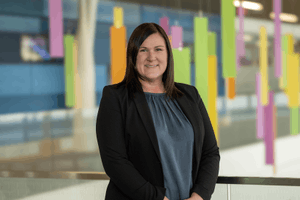Behavioral Sleep Medicine
This program is currently at capacity and not accepting new patients. We are working hard to make changes, so we can meet our community's behavioral sleep medicine needs.

Problems sleeping can have a negative impact on a child’s health, mood and quality of life. A lack of sleep can also affect a child’s ability to pay attention, remember, learn, and control their emotions. Pediatric sleep psychologists are specialists trained to diagnose and treat a variety of sleep problems that are behaviorally or psychologically based.
Learn more...
Department: 330-543-8885
About Behavioral Sleep Medicine
Behavioral sleep medicine could help if your child has any of the following issues:
- Problems falling asleep, staying asleep or waking up too early.
- Difficulty sleeping in their own bed.
- Issues going to bed or staying in bed.
- Nighttime fears or anxiety.
- Nightmares or sleep terrors.
- Daytime sleepiness or difficulty waking.
- Challenges adjusting to or using positive airway pressure (PAP) therapy for sleep apnea.
- Sensitivities that may make it difficult to complete a needed sleep study.
Nina Kuei, MD
Developmental-Behavioral Pediatrician and Pediatric Sleep Medicine Physician
Akron Children’s Hospital Sleep Center
PATIENT INSTRUCTIONS FOR A POLYSOMNOGRAM (PSG/SLEEP STUDY)
Parking Instructions and Directions
All patients will go to Admitting on the 3rd floor in the main hospital, before going to the Sleep Lab. Park in the Bowery Street parking deck, P1 (199 West Bowery Street, Akron OH 44308), enter the Considine building on level 3 and take the 2nd bridge to the Main Hospital. Admitting will be on your right past the ball machine and yellow elevators.
The Considine Building main doors lock at 8:00 p.m. If you are being dropped off, you can enter the hospital through the Bowery Street parking deck (P1) and follow instructions above. Information Desks are available until 9:00 p.m. to assist you. Please arrive before 9:00 p.m. If you arrive after 9:00 p.m. the doors to the Considine Building will be locked and you will need to park in the Exchange Street Parking deck and enter through the Kay Jewelers Pavilion P2 (348 Locust Street, Akron OH 44302).
What to do at home before the sleep study
- Complete the 2-week sleep log and patient questionnaire and bring with you to the sleep study.
- Keep normal sleep routines including naps (infants and toddlers).
- No food or drinks containing caffeine 24 hours before sleep testing (coffee, tea, chocolate).
- Eat your dinner before coming to the sleep lab.
- Bathe and cleanse hair without using conditioner.
- Do not use lotion, oils, hairspray, gel or makeup.
- No braids or ponytails are allowed.
What to bring to the sleep lab
- Bring all bedtime medications to give to your child at night and necessary supplies.
- Bring any breathing aids (PAP mask and tubing, vent/trach supplies).
- Bring or wear 2-piece comfortable pajamas. (No one piece pajamas or onesies)
- Bring a light snack and caffeine free drink.
- Bring favorite blanket, pillow, or toy.
Sleep study rules
- Only ONE parent or legal guardian is allowed to stay in the patient room. It is required for the parent to stay the entire night and care for your child for all patients under the age of 18 years old. You are not allowed to leave the sleep lab for any reason during testing.
- No siblings are allowed.
- No cell phone use will be allowed in the sleep testing room once lights are off.
After sleep study
- Unless your child is scheduled for daytime testing, you will be able to leave from the sleep lab between 6:00-6:30 am and it will be necessary to leave the patient room at that time.
- Sleep study results will be sent to the ordering physician within 10 business days.
Contact Information
- Questions, cancel or reschedule call: 330-543-4485 or 1800-262-0333 ext 34485, during Monday-Friday 8-4:30.
- After hours: Sleep lab- 330-543-3390 or contact the Hospital Operator at 330-543-1000 and ask for Sleep Lab
You can also visit us on the web at https://www.akronchildrens.org/sleepcenter
Behavioral sleep medicine is most effective when the child and family are ready for change and open to modifying sleep routines, habits and behaviors.
During the first appointment, you will share your concerns and discuss your child’s:
- Current sleep patterns.
- Sleep environment.
- Behaviors and feelings that may create barriers to good sleep.
- Daytime functioning.
Next, a treatment plan is developed, which may include:
- Steps to take to help your child go to bed more easily or independently.
- Skills to manage nighttime fears and anxiety.
- Strategies to reduce nightmares.
- A positive reinforcement system to increase your child’s motivation to change sleep behaviors.
- Modifying current behaviors and thoughts that impact their ability to sleep.
- Bright light therapy, to change sleep-wake schedules.
- Methods to help your child adjust to and use PAP therapy.
- Ways to prepare for an upcoming sleep study.
- Coordination with sleep medicine providers to optimize treatment.
Treatment is usually 4-5 monthly sessions, with a booster session a few months later. The booster session is good way to make sure that gains are still present, address questions or concerns, and review and update recommendations.
If it is determined that other behavioral health concerns are impacting your child, our team will connect you with additional treatment resources.


















